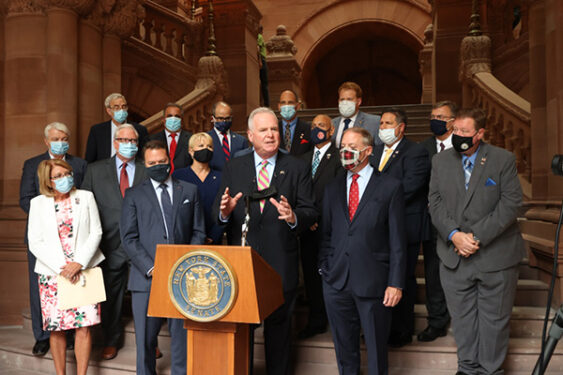
‘I’m Willing To Lose An Election Because of This Issue’
PROSPECT HEIGHTS — Assemblyman Michael Tannousis knows that, as a pro-life supporter, he’s in the minority in the New York State Legislature, where bills favoring abortion usually pass by large margins. But that doesn’t bother him.
“I feel that I’ve been fighting a continuous battle since the time I got to the state legislature. If you have convictions, you fight for what you believe,” said Tannousis, a Republican representing Bay Ridge and parts of Staten Island.
For pro-life lawmakers, advocacy in Albany means fighting uphill battles.
Here’s an example of what they’re up against: The Reproductive Health Act, which expanded abortion rights and opened the door to third-trimester abortions, won approval by the lopsided margins of 92-47 in the State Assembly and 38-24 in the State Senate in 2019.
Kathleen Gallagher, director of pro-life activities for the New York State Catholic Conference (NYSCC), said that 10 years ago, there would have been at least 57 votes against the Reproductive Health Act in the Assembly and 40 “no” votes in the Senate.
During the same year when the Reproductive Health Act was passed, another bill under consideration would have required the state Department of Health to conduct a study of pro-life pregnancy centers—described in the legislation as “limited-service pregnancy centers.”
The New York State Right to Life organization argued that the bill would have unfairly placed pro-life centers under a cloud of suspicion.
But the bill passed the Assembly 99-43 in June, 2019. It has not come up for a vote in the Senate.
“I think New York is a little too far to the left, and it’s increasingly going more to the left by the day. I think that it’s a very dangerous situation,” Tannousis said.
“In Albany, the tail wags the dog,” said State Senator George Borrello, a Republican representing Chautauqua County. “It’s almost like pro-abortion members, they look at it as a contest. They’re trying to make sure New York stays ahead of other states by having the most pro-abortion laws in the country.”
According to the U.S. Centers for Disease Control (CDC), approximately 12.2% of all abortions in the U.S. in 2017 took place in New York State.
In 2018, 25.5% of all pregnancies in the state ended in abortion. That’s 10 percentage points higher than the U.S. as a whole, where 15.9% of pregnancies ended in abortion.
The fight against abortion, which the U.S. Conference of Catholic Bishops called a “pre-eminent priority” in 2019, is now taking center stage even more.
On Dec. 1, the U.S. Supreme Court heard oral arguments in Dobbs v. Jackson Women’s Health Organization, the case involving a Mississippi law that would effectively ban abortions after 15 weeks. The court is expected to render its ruling in June.
In New York, pro-life lawmakers know their pro-abortion colleagues have the upper hand. Still, they remain steadfast.
Assemblyman Simcha Eichenstein has a sign in his Albany office with a quote from John Quincy Adams: “Always vote for principle, though you may vote alone, and always cherish the sweetest reflection that your vote is never lost.”
“I’ll sometimes stare at that quote just before I head over to the assembly chambers, particularly when I know there’s a vote coming up on an issue about which I’ll be vastly outnumbered, said Eichenstein, a pro-life Democrat representing Borough Park. “It gives me the inspiration to do the right thing, even if it’s not the popular opinion of the day.”
Assemblyman Michael Fitzpatrick, a Republican representing Islip and Smithtown on Long Island, is equally confident in his views. “The litmus test is, ‘Are you going to stand on principle, even if it means losing votes?’ I’m willing to lose an election because of this issue,” he said.
Many pro-life lawmakers point to their religious upbringing as a reason for their views.
State Senator Simcha Felder, a Democrat representing Borough Park and parts of Flatbush, said being an Orthodox Jew is central to his identity. “I was always taught to respect life,” he said.
During a legislative session several years ago, Felder received permission from his rabbi to stay in Albany during the Jewish Shabbos just so he could vote against a pro-abortion bill.
Tannousis, a graduate of Monsignor Farrell High School, said that, in addition to his faith, his past as a former assistant district attorney factors into his thinking.
“I prosecuted homicide cases, I prosecuted individuals who did not value life. I sought justice for those victims and their families. The experiences I’ve had in my career led me to value human life,” he said.
NYS Right to Life and the Catholic Conference said pinpointing the number of true pro-life supporters in the Legislature is tricky because lawmakers’ views are fluid. There are legislators who will vote against one bill that expands abortion access and then turn around and vote in favor of a different pro-abortion bill.
Given the political temperature in New York, there are legislators who sometimes vote against abortion rights bills but would be loathe to describe themselves as pro-life, advocates said.
Members of the minority who take pro-life stands deserve praise, according to Gallagher.
“We are not unaware of the sacrifices these officials make and the enormous political pressures they resist,” she said. “We commend them for their courage and thank them for defending the most defenseless of our brothers and sisters — the voiceless and voteless unborn,” she said.
“Just as with Queen Esther, who desperately wanted to save her people but who had no idea if she would be successful or if her life would be taken for trying, we need to consider where God has put us and do what is right without knowing whether we will be successful,” said Lori Kehoe, a NYS Right to Life spokeswoman.
